- Home
- Michelle Hodkin
The Reckoning of Noah Shaw Page 10
The Reckoning of Noah Shaw Read online
Page 10
“It’s rude to appear where one hasn’t been invited,” I say brightly.
M ignores me. “Hello again, Alastair.”
Goose sighs. “Knew my name all along, then?”
She smiles patronisingly. “I can call you Goose, if you like.”
“I like,” he says back.
Watching them, I realise I’ve no patience for this. For her. “What is it you want?”
M takes a deep breath, then breathes out a long, drawn-out sigh. “I want to apologise.”
She shifts her weight. She’s shorter than I remembered—maybe it’s the trainers? In the light, alone, I notice details I missed at the manor; her sweater, three sizes too large. Her lips and skin free from any obvious makeup. She looks small. Young. Not even as old as the thirty-six years she claimed when we first met.
She was outfitted like a Raymond Chandler character, then. A dame in distress, pleading for my help. Today, she’s a grad student, eager to get on with her research.
The change feels calculated. Which is why I say, “Apology accepted,” and then, to Goose, “Let’s go.”
I turn around before he can answer, making for the door back into the pub. I fully expect to hear M call out after us; I’m surprised when she doesn’t.
Goose catches up to me in a few strides, now back in the darkened pub. My pace is quick.
“What’s going on?” he asks.
“Nothing,” I say, a bit peevishly.
“Why, though?” he asks, earnest.
“Because there’s no point staying.” What’s changed, since I left her car in the middle of the street? She sent a different car to fetch me at Goose’s hospital, somehow knowing where I’d be. She arranged for a plane—my plane—to bring me to England, where she wanted me to go. Then she found us again when all I wanted to do was hide.
I’m done with it, being summoned. Done being herded. Done being pushed. Just, done. “She wants something I’m not inclined to give,” I say to Goose as we pass the old men at the bar.
“Something about your memories, right?” We walk outside, the air chilled and damp. “Your mum’s?” he adds delicately.
“Don’t think so,” I say. “She mentioned an ancestor of mine, whom she knew.” The pub sign above us creaks and sways in the breeze. “My great-great-grandfather. Saw a portrait of him today, actually. At the manor.”
“That’s kind of brilliant, you’ve got to admit,” Goose says. He’s stopped in front of the pub. “She barely looks thirty.”
“Thirty-six,” I say, despite myself.
Goose runs his hand over his jaw. “How, though? If she’s as old as you say—she’d have been born in Victorian England.” He looks longingly at the entrance to the pub.
Shite. “You want to go back in.”
Goose lets his head fall back. “Come on, mate!” he says, staring at the sky. “It’s pretty fucking incredible. Think of everything she must’ve seen.”
“Look,” I say wearily. “I know this all seems fascinating and special at the moment, but going back in there? It won’t be worth it. Promise.”
Goose isn’t having it, though. “Worth what?” he asks, animated. “An hour talking to her? An afternoon?”
I shake my head slowly. “That’s how it starts,” I mumble.
“What, we can’t spare the time?” He shoots me a look.
Fuck. I run my hands through my hair, groaning.
“Let’s just go back in, hear her out. If we don’t like what she says, we go. Easy. Done.”
I know better than to agree to it, is the thing. Truly, I do. But he sounds so damn reasonable, and rational. It chips away at my resistance. Despite what I know.
Goose bites his lip, his expression pleading. “If nothing else, we ought to go back in for a glimpse of what our future’ll look like in a hundred fifty years.”
“Our abilities are gone, remember?”
“She said she can help get them back, though, remember?” he asks mockingly.
I look away from the pub, toward the road that leads to the manor. “I don’t know that I want them back.”
“Well, I do.” Goose lifts his chin.
“You might regret it.”
“And you might not.” He rolls his eyes. “Honestly, when did you get so dull?”
“Fine!” I say, surprising myself a bit. “Fine.” Goose flashes a toothy grin. “Christ, you’re annoying.”
“You’re going to thank me.” He walks past me, straight into the pub. I’m following him, now, as he strides eagerly toward the back garden. M’s still perched on the edge of the table where we left her, only now she’s smoking. And there’s a bottle of liquor on the table as well, along with three glasses.
“He has questions,” I say flatly.
She pulls at her cigarette, then takes it from her mouth. Her lips curl into a smile. “I have answers.” She extends her leg under the table, pushing a chair toward me. The iron scrapes the stone. “Have a seat.”
20
INTO HER CONFIDENCE
SHE HAS GRACE ENOUGH NOT to look smug at our return, at least. Then takes the bottle and pours out a finger of scotch into each glass, offering them to us.
“I ordered it before you left,” she says. “I did mean what I said before. I am sorry.”
“It’s fine,” I say dismissively. “Goose?” Might as well get on with it.
“Right,” he drawls. “I’m not quite sure how to ask without being rude—”
M turns her smile on him. “Don’t worry about it. I’m hard to offend. What would you like to know?”
Goose takes a sip of scotch, considering his words. He leans one elbow on the table, chin in hand. “Your origin story, for a start.”
Her smile flickers for a moment. “So would I.”
Goose’s brow furrows.
“How much has he told you?” M tips her head at me, still speaking to Goose, though.
“Hmm.” He sucks in his lips. “Everything, I reckon? Bit hard to say, though . . . we were rather drunk, at the time.”
The corner of M’s mouth turns up.
“The part I’m having trouble with at the moment . . .” Goose starts. “You’re Mara’s grandmother, Noah said.”
“That’s right.”
“Which makes you . . . how old, precisely?”
“Honestly?” She shrugs, resigned. “I don’t know.”
Goose’s eyes flick to mine. “Noah said . . . you were born in Victorian England?”
I’m momentarily tempted to correct him, but M shakes her head. “I wasn’t born in England at all. At least, I don’t believe so.” Her brows draw together, before a conspiratorial grin appears on her lips. “That’d be a plot twist, wouldn’t it?” she says to me.
I’ve managed not to get drawn into things, yet. And plan to keep it that way for as long as possible.
M takes a drag off her ciggy, exhaling the smoke through her nose. “I was found in British India,” she says to Goose. “During Queen Victoria’s reign. I don’t know when I was born. I . . . seemed young, I suppose, when I was taken.” A faraway look comes over her face for a moment, before she turns to me. “By your great-great-grandfather.”
Goose’s eyes widen, his mouth forming a surprised grin. “Noah saw portraits of him today, didn’t you?”
M raises her brows. “Did you? Which?”
I don’t answer her, but Goose nudges me with his foot.
“Which what?” I ask her.
“Which portraits? They keep a few of him on display, I hear.”
Something about the way she says it catches at me. “You hear?” I ask. “Why not just visit yourself?”
“I’ve seen some of the older ones, once. But I haven’t been to the manor in quite some time.”
“Why not?” Goose asks.
“I’ve learned to avoid cameras, at my age,” she says wryly.
“Yet you were there today—”
“Outside, not in. And out of view of the security cameras.”
/> My eyes narrow at that. “What are you afraid of?” I ask. “Why hide?”
“I don’t hide. I move. All of us do.” The smoke from her cigarette curls in the air. “Easier to avoid questions that way, I’ve learned. Tried to collect the pictures that I was stupid enough to pose for, once, and got most of them, but some have been more . . . inaccessible than others. As for the manor,” she goes on, “I thought it wiser to avoid drawing notice for my uncanny resemblance to a nineteenth-century portrait hanging in one of the rooms.”
“Wait, really?” Goose leans in.
She nods. “I sat for it with the second Simon and Elliot Shaw, as well as Sarah, Simon’s wife.” She looks at the table. “She commissioned the same painter who worked with Simon, before . . .” Her voice trails off, but she recovers quickly. “Elliot insisted on Dash being in it—one of Lord Simon’s foxhounds,” she adds in response to our confused expressions. Her eyes squint, a bit. “Elliot’s grabbing his collar in the painting, if I remember correctly? Wouldn’t sit still for it. Never liked me, much.” Then, to me, “Which portraits did you see?”
I shrug offhandedly. “I don’t know. Wasn’t as though they had titles or anything.”
“What was he doing in them?” she asks.
“Sitting in one, standing in another,” I say vaguely. It’s a bit of a heady feeling, having answers to someone else’s questions, for a change. There’s power in it.
M knows it. Which is why it’s gratifying when she presses, “Was there anything that stood out? Anything at all?”
I could say no. Shrug. Deflect. But her questions have me rather curious now, given what the curator, Mrs. Balfour, said.
I take a drink. Make her wait for it. “The curator mentioned there was a fire, and some of the paintings have been restored,” I say then, searching her face as I speak. “The ones I saw had been done the same year, but he hardly looked like the same man in them.”
M inhales slowly. “They were painted before, and after.”
Goose looks puzzled. “Before and after what?”
M offers a small, hopeful smile to me. “That’s what I’ve been hoping you’d help me find out.”
“You knew him, though, you said,” Goose says with a narrowed look.
“I met him,” M corrects. “Once. And my memory . . . there are gaps in it.” She closes her eyes. “I remember being in the carriage with him. The feel of the velvet . . .” Her hand reaches up to her throat, as if she’s feeling for the pendant that was once there. “And the smell. Sandalwood, and something else; like meat that had been left out in the sun.” She gives a single shake of her head. “There’s hardly anything else, from before.”
“What about after?” Goose asks her.
I knew some things, about after. From Mara. From the letters Simon Shaw wrote, and the ones Sarah Shaw wrote and the journal she kept, even after his death.
But here, in front of me, is the source.
“Simon brought me to the port—Calcutta, though I’m not sure I knew the name, then. He left me with a man I called Uncle. He took me in to live with his family, and I did, for a bit. They fed me. Taught me. Cared for me, like family. They were kind.” She looks down. “They were murdered.
“There was an Englishman Uncle had brought me to at the port, on occasion. He asked Uncle questions about me, in front of me—what I was learning, how I was developing, whether I’d fallen ill. I was measured. Inspected. Uncle was paid each time. After he was murdered, Sister took me to the Englishman.” Her jaw tenses. “After she was murdered, he arranged for me to be delivered to your family in London.”
She stops talking, and only after the silence stretches on for over a minute do I realise she won’t start again, unless I urge her on.
“That hardly brings us up to date,” I say.
Her cigarette’s burned down to ash. She flicks it to the ground and stubs it out with the toe of her white trainer. Then takes a sip of scotch from her glass, making a face as she looks at it. “I’m going to need something a bit lighter if you expect me to cover all three centuries.” She leans to her right, looking over Goose’s shoulder at the door. “Doubt they have table service, back here.” She meets his eyes. “Would you mind, terribly?”
Faced with the prospect of being rude or being excluded, Goose, like a proper Englishman, chooses the latter.
“What would you like?” he asks, only a mild hint of reluctance in his voice.
“A pint would be lovely,” she says with a smile.
“Of course,” Goose says. He stands, ruffles my hair as he leaves. Rather roughly.
Then, once he’s gone, “Did you know about any of it?” M asks. “Anything I said?”
Not entirely sure what she means or what she’s after, I say cautiously, “Bits, here and there.”
“You haven’t remembered any of it, though? Anything about Simon . . . ?”
“Why would I?”
She rubs the bridge of her nose. “You’re connected to him, I told you.”
“I’m connected to my mother, too, aren’t I?” I ask sharply, before taking another sip. “Why would I remember someone I’ve never known, instead of someone I wish I’d known?”
M considers my words. “That’s one reason, right there. You loved your mother. But some part of you might be worried, subconsciously, about what you might learn if you open that door.”
I see myself back in Brooklyn, in the flat, holding my mother’s journal:
I don’t know if I can bring myself to love him.
Seems a crime to marry not for love, but for purpose, even though I know it won’t be forever.
Is that even worse? Marrying him, conceiving his child, knowing that someday I’ll die for it?
And then, like poison, my father’s voice seeps into my mind, sneering: Your mother gave up her own life to have you, and you kept spitting on her memory.
I take another drink. “What’s Simon got to do with it?” I ask, momentarily relieved by the scorch in my throat.
“Haven’t you ever wondered why your parents ended up together?” she asks.
I didn’t need to wonder. I’d been told.
The mental image of my sunlit flat splinters, and a new one spiders together. The stacked trunks filled with my family’s history are replaced with mannequin parts as the abandoned factory fills itself in around me, grey concrete and grimy glass:
“The man you call Lukumi, who I knew as Lenaurd, manipulated your mother, recruited her, then introduced her and me so we could breed. You were planned, Noah. Engineered. To be the hero. To slay the dragon. But you fell in love with it instead.”
I can almost feel the softness of Mara’s cheek against mine as she rested in my lap on the hard cement floor, ready to die after my father forced her to choose between her life and her brother’s. Ready for me to kill her.
And then it’s Mara’s voice I hear:
The villain is the hero of her own story. No one thinks they’re a bad person. Everyone has reasons for doing what they do.
21
HAVE I CURSED YOU
THE SOUND OF MARA, HER voice, her heartbeat, her breath, her sound—leaves me aching with loss.
“There’s a reason it was your parents, specifically, that the professor chose.” It’s my mother’s words that flood my mind next:
I’ve talked to Mara about it Says she’s dreamt about my death “a thousand ways over a thousand nights” and that there’s no timeline in which I’ll have his child and live.
She says I might regret it, my choice, once I have that child in my arms.
As the professor says, every gift has its cost.
M casts her gaze down, to her feet. “I did help him. I regret it.”
“I’m sure you have many regrets,” I say with bitterness. Projecting, of course.
“I do,” she says earnestly. “You were told about the archetypes, yes? The professor told me that too,” she adds, with barely concealed resentment. “Convinced me that the world needed you,
a Hero.”
The word parallels my thoughts so closely that I look up, startled, and wonder if she can hear them.
“What’s your Gift?” I ask warily. “Your Affliction?”
She looks confused, for a moment, at the change of subject. “I thought you knew.”
“Remind me,” I say tonelessly.
M’s expression shifts. Hardens. “He told me I was the Shadow.”
“And what does that mean?”
“What has it meant for Mara, in your experience?”
My back goes up. “You’re not Mara.”
She’s nodding now, in agreement. “Exactly. He told me what I was, and told me what she would become, if I didn’t die.” She looks at her own glass, then, and in one quick movement, drinks what’s left in it. “Nearly everything I know I’ve been told by the professor. He told me what he wanted me to believe. What it served him to have me believe. I spent too many years, believing him. Believing in him. Not knowing any better.”
“Why does it matter now, all of a sudden?” I say, on edge still. “And what’s Simon got to do with it?” The sound of my father’s voice, the memory of what he said, still coats my mind like some toxic film. I finish my drink to dissolve it, pouring another straightaway. I’m fiending for a smoke, too, I realise; Mara hated smoking, so I’ve mostly stopped carrying them, not that I ever felt the nicotine before. I’d feel it now, though, surely.
M considers her words before speaking. “I meant what I said, when I apologised to you. I made assumptions because I knew your parents, your family, and about you through others. I shouldn’t have—I don’t know you and I don’t know my granddaughter . . .”
Her voice trails off and her silence stretches on. I arch an eyebrow. “There’s a but, lurking, isn’t there.”
“If you say that Mara doesn’t need saving, that she doesn’t need help, then I believe you.” She takes a deep breath. “But I need help.” The words seem to cost her; her shoulders slouch, and she seems smaller. “I need saving.” She looks down at the table, picks at the peeling paint with her fingers. “You were right about me. I have many regrets. I’ve done things that I . . . I’ve done things,” she finishes, her voice lowered.

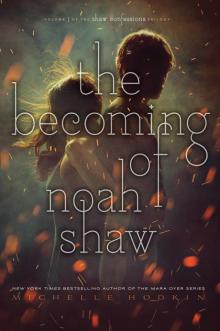 The Becoming of Noah Shaw
The Becoming of Noah Shaw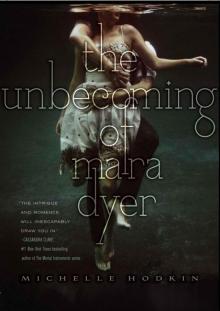 The Unbecoming of Mara Dyer
The Unbecoming of Mara Dyer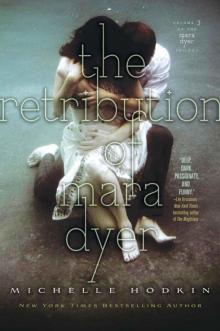 The Retribution of Mara Dyer
The Retribution of Mara Dyer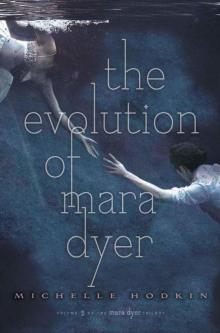 The Evolution of Mara Dyer
The Evolution of Mara Dyer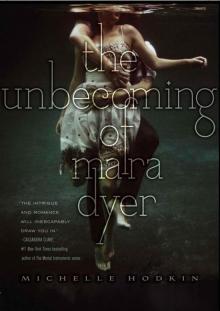 The Unbecoming of Mara Dyer md-1
The Unbecoming of Mara Dyer md-1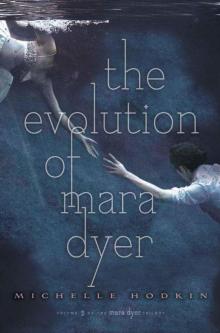 The Evolution of Mara Dyer md-2
The Evolution of Mara Dyer md-2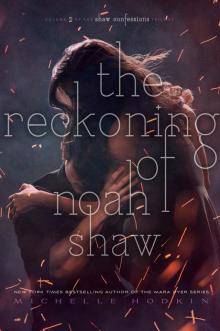 The Reckoning of Noah Shaw
The Reckoning of Noah Shaw